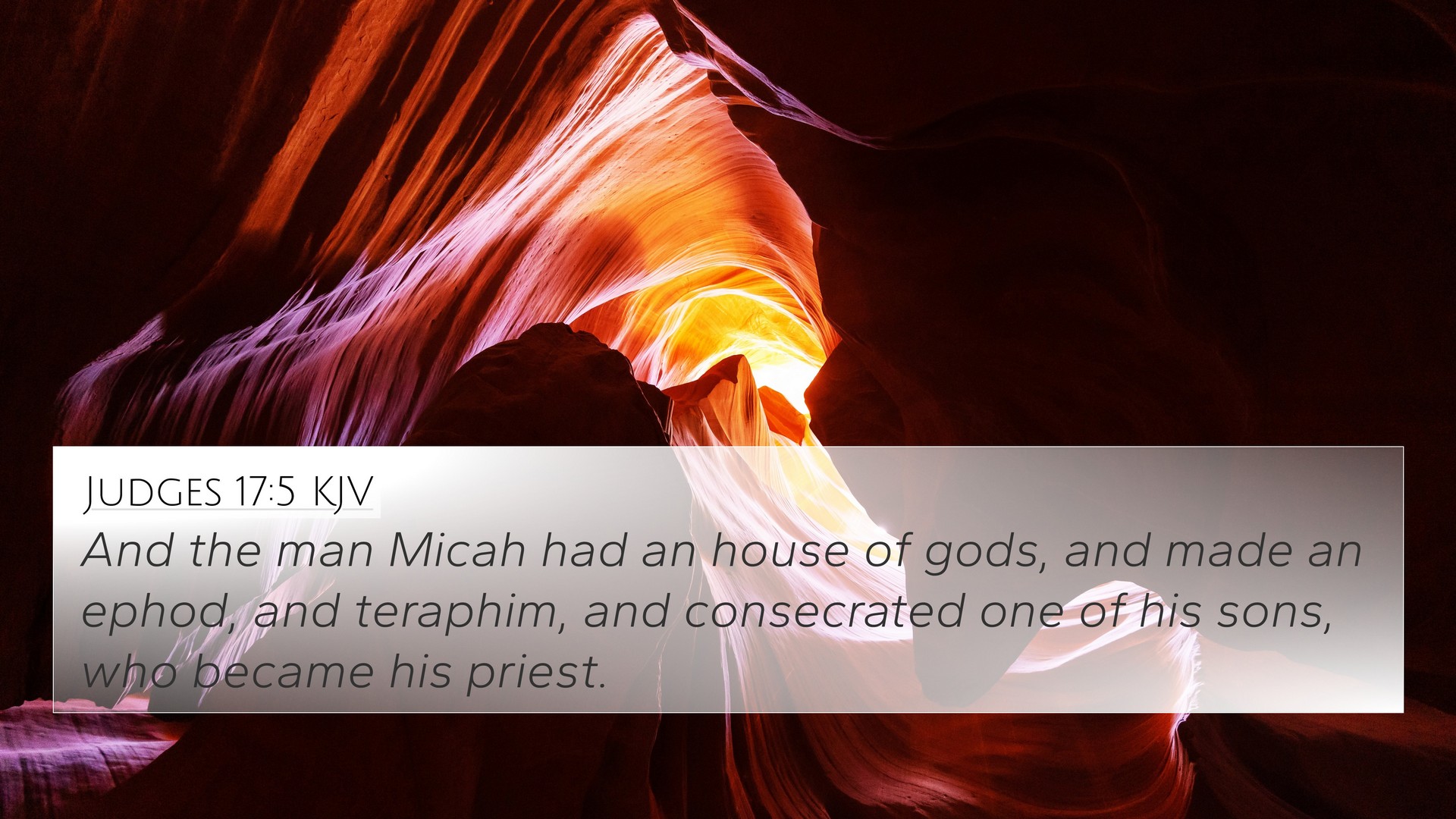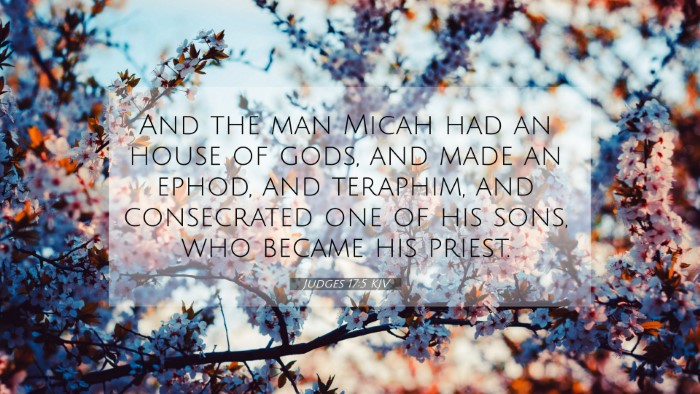Old Testament
Genesis Exodus Leviticus Numbers Deuteronomy Joshua Judges Ruth 1 Samuel 2 Samuel 1 Kings 2 Kings 1 Chronicles 2 Chronicles Ezra Nehemiah Esther Job Psalms Proverbs Ecclesiastes Song of Solomon Isaiah Jeremiah Lamentations Ezekiel Daniel Hosea Joel Amos Obadiah Jonah Micah Nahum Habakkuk Zephaniah Haggai Zechariah MalachiJudges 17:5 Similar Verses
Judges 17:5 Cross References
And the man Micah had an house of gods, and made an ephod, and teraphim, and consecrated one of his sons, who became his priest.
Uncover the Rich Themes and Topics of This Bible Verse
Listed below are the Bible themes associated with Judges 17:5. We invite you to explore each theme to gain deeper insights into the Scriptures.
Judges 17:5 Cross Reference Verses
This section features a detailed cross-reference designed to enrich your understanding of the Scriptures. Below, you will find carefully selected verses that echo the themes and teachings related to Judges 17:5 KJV. Click on any image to explore detailed analyses of related Bible verses and uncover deeper theological insights.
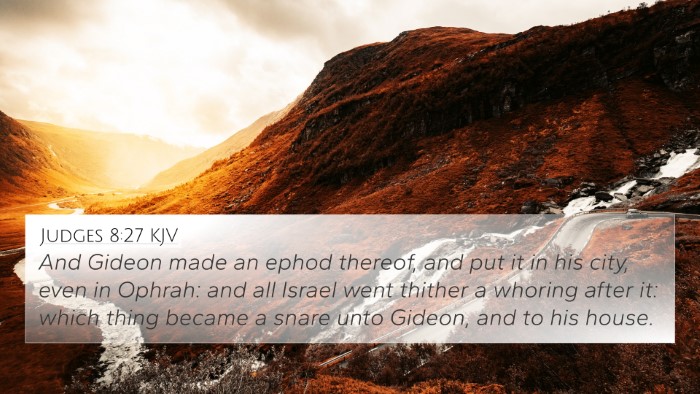
Judges 8:27 (KJV) »
And Gideon made an ephod thereof, and put it in his city, even in Ophrah: and all Israel went thither a whoring after it: which thing became a snare unto Gideon, and to his house.

Genesis 31:19 (KJV) »
And Laban went to shear his sheep: and Rachel had stolen the images that were her father's.
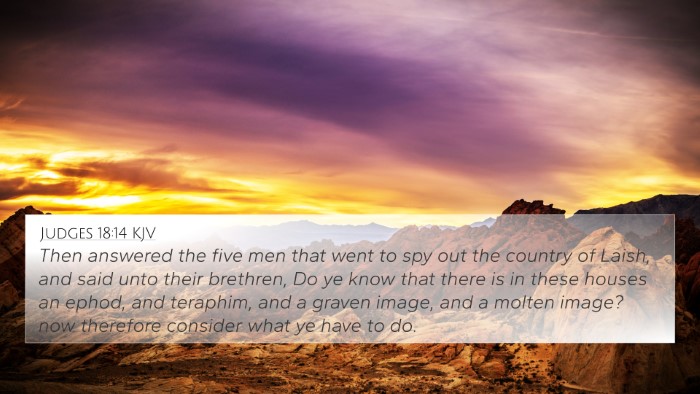
Judges 18:14 (KJV) »
Then answered the five men that went to spy out the country of Laish, and said unto their brethren, Do ye know that there is in these houses an ephod, and teraphim, and a graven image, and a molten image? now therefore consider what ye have to do.
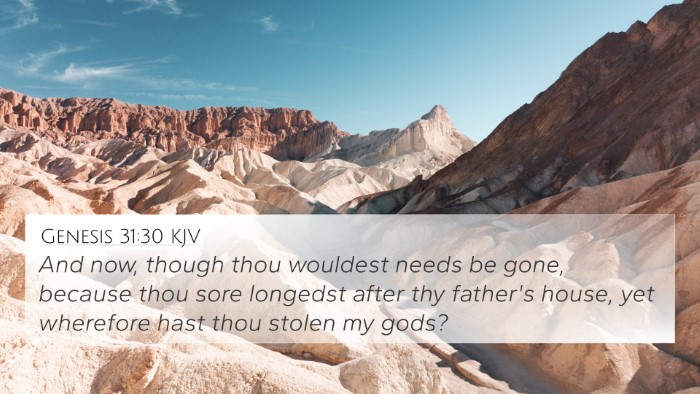
Genesis 31:30 (KJV) »
And now, though thou wouldest needs be gone, because thou sore longedst after thy father's house, yet wherefore hast thou stolen my gods?
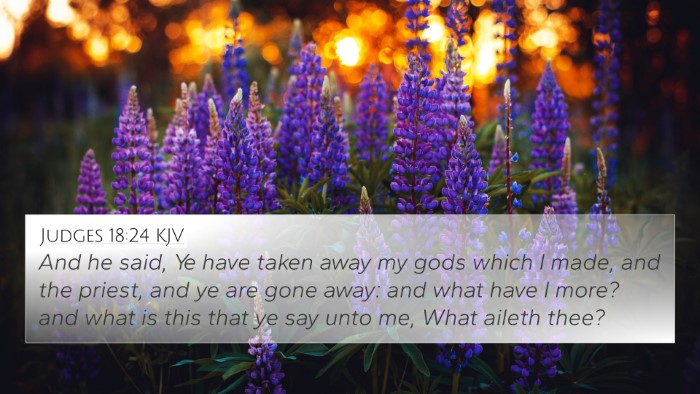
Judges 18:24 (KJV) »
And he said, Ye have taken away my gods which I made, and the priest, and ye are gone away: and what have I more? and what is this that ye say unto me, What aileth thee?
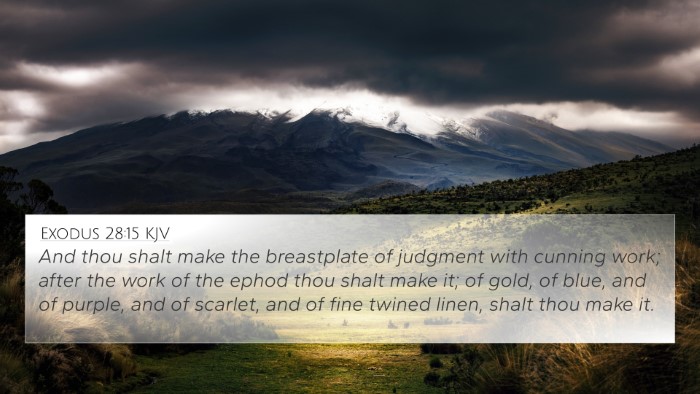
Exodus 28:15 (KJV) »
And thou shalt make the breastplate of judgment with cunning work; after the work of the ephod thou shalt make it; of gold, of blue, and of purple, and of scarlet, and of fine twined linen, shalt thou make it.
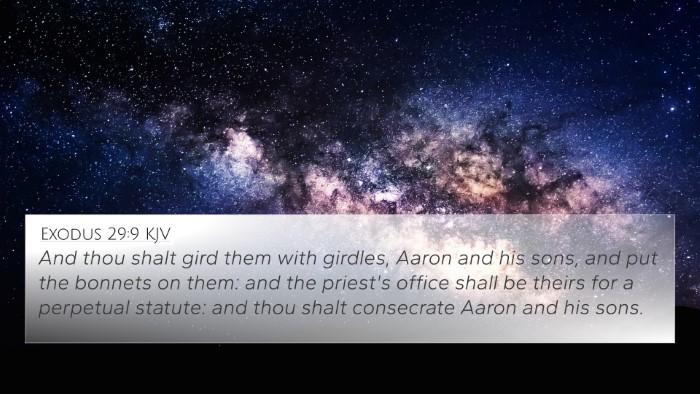
Exodus 29:9 (KJV) »
And thou shalt gird them with girdles, Aaron and his sons, and put the bonnets on them: and the priest's office shall be theirs for a perpetual statute: and thou shalt consecrate Aaron and his sons.
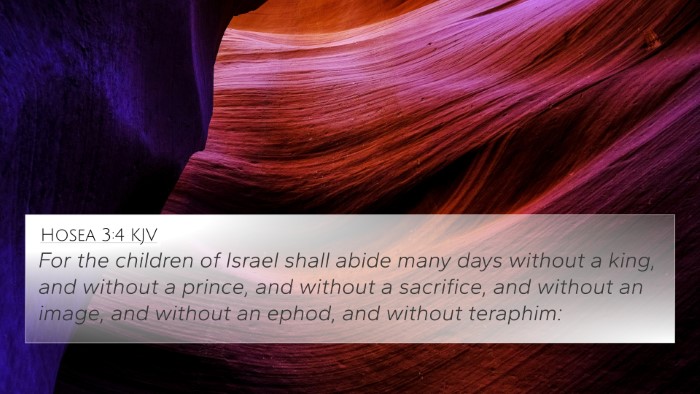
Hosea 3:4 (KJV) »
For the children of Israel shall abide many days without a king, and without a prince, and without a sacrifice, and without an image, and without an ephod, and without teraphim:
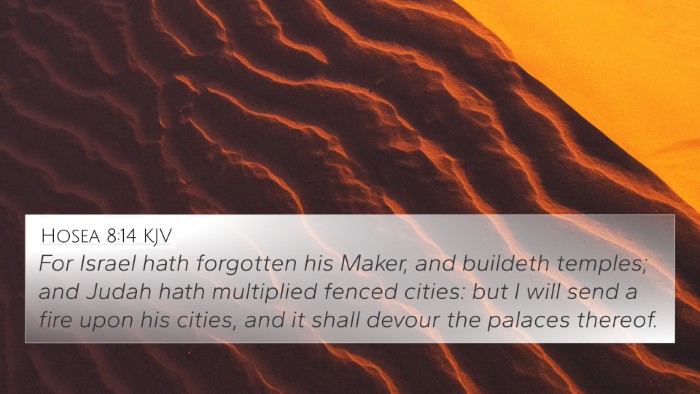
Hosea 8:14 (KJV) »
For Israel hath forgotten his Maker, and buildeth temples; and Judah hath multiplied fenced cities: but I will send a fire upon his cities, and it shall devour the palaces thereof.

Ezra 1:7 (KJV) »
Also Cyrus the king brought forth the vessels of the house of the LORD, which Nebuchadnezzar had brought forth out of Jerusalem, and had put them in the house of his gods;
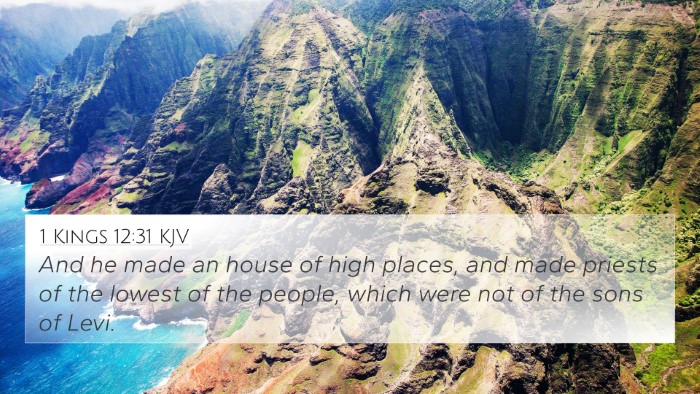
1 Kings 12:31 (KJV) »
And he made an house of high places, and made priests of the lowest of the people, which were not of the sons of Levi.
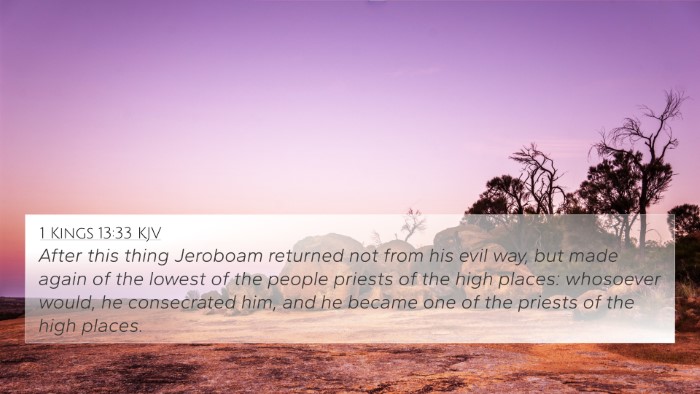
1 Kings 13:33 (KJV) »
After this thing Jeroboam returned not from his evil way, but made again of the lowest of the people priests of the high places: whosoever would, he consecrated him, and he became one of the priests of the high places.

1 Samuel 23:6 (KJV) »
And it came to pass, when Abiathar the son of Ahimelech fled to David to Keilah, that he came down with an ephod in his hand.

Exodus 24:5 (KJV) »
And he sent young men of the children of Israel, which offered burnt offerings, and sacrificed peace offerings of oxen unto the LORD.
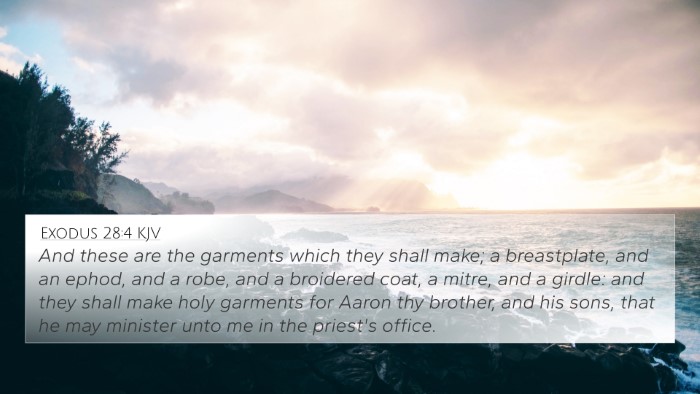
Exodus 28:4 (KJV) »
And these are the garments which they shall make; a breastplate, and an ephod, and a robe, and a broidered coat, a mitre, and a girdle: and they shall make holy garments for Aaron thy brother, and his sons, that he may minister unto me in the priest's office.
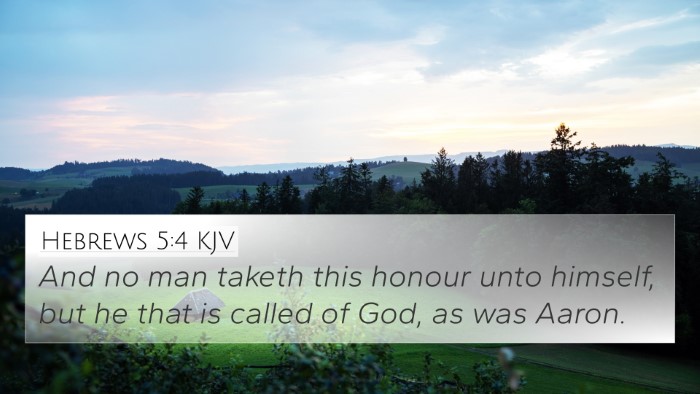
Hebrews 5:4 (KJV) »
And no man taketh this honour unto himself, but he that is called of God, as was Aaron.
Judges 17:5 Verse Analysis and Similar Verses
Understanding Judges 17:5 - A Comprehensive Analysis
Judges 17:5 states: "And the man Micah had an house of gods, and made an ephod, and teraphim, and consecrated one of his sons, who became his priest." This verse introduces Micah and his personal religious practices, which serve as a backdrop for the narrative of idolatry during the period of the Judges.
Summary of Key Themes
- Idolatry: The establishment of personal altars demonstrates the decline of true worship.
- Spiritual Leadership: Micah's actions in consecrating his son highlight the informal and sometimes misguided nature of leadership.
- Dissatisfaction with True Worship: The creation of personal gods indicates a deeper issue of discontent with the established religious system.
Commentary Insights
From Matthew Henry's commentary, we learn that Micah's idolatrous practice illustrates the corruption of true worship during the special period of judges. The verse paints a picture of a culture wherein each person did what was right in their own eyes, emphasizing the chaotic spiritual state of Israel.
Albert Barnes adds that the ephod and teraphim signify a departure from the Law of Moses and suggest a household religion that was self-centered rather than community-oriented. Such practices were common in Israel at the time, leading the people away from the covenant.
Adam Clarke highlights that Micah's desire for assurance and guidance led him to create and utilize his own forms of worship, which points to a fundamental misunderstanding of God's nature and intended worship.
Bible Verse Cross-References
To fully grasp the implications of Judges 17:5, it is important to explore its relationships with other Scripture passages. Here are some relevant cross-references:
- Exodus 20:4-5: Prohibition against the making of graven images.
- Deuteronomy 12:8-9: Instructions about worship in the Promised Land.
- 1 Samuel 15:23: The rejection of rebellion as akin to idolatry.
- Hosea 8:4: A critique of Israel creating their own kings and images.
- Judges 21:25: "In those days, there was no king in Israel; everyone did what was right in his own eyes."
- 1 Kings 12:28-30: Jeroboam's establishment of idol worship in Israel.
- Micah 6:6-8: A call to true worship and justice versus ritualistic practices.
Thematic Bible Verse Connections
By examining the broader narrative of the Judges, we can see the recurring theme of human failure in upholding God's laws. The idolatrous practices of Micah's household are symptomatic of a period fraught with moral and spiritual decline. The instances of idolatry lead to divine displeasure and the inevitable consequences that follow.
Comparative Bible Verse Analysis
Exploring Judges 17:5 in light of both Old and New Testament texts reveals critical insights about the nature of worship, leadership, and God's requirements:
- Hebrews 13:8: "Jesus Christ is the same yesterday and today and forever." This emphasizes the unchanging nature of God's expectations for worship.
- Matthew 15:9: "But in vain they do worship me, teaching for doctrines the commandments of men," which aligns with Micah's actions.
- Acts 17:29: Paul's sermon against idolatry reflects the New Testament's continuity in condemning such practices.
Interpretative Approach
A comprehensive understanding of Judges 17:5 can be approached through various interpretative methods, including structural analysis, thematic exploration, and contextual reading within the broader narrative of judges. Tools for Bible cross-referencing, such as a bible concordance or bible reference resources, can enhance the study of this verse and its connections.
Conclusion
Judges 17:5 serves as a significant verse illustrating the decline of Israelite faithfulness during the era of the Judges. Through a critical analysis and cross-referencing with related scriptures, a deeper understanding of biblical themes surrounding idolatry, personal worship practices, and spiritual leadership emerges. This verse not only informs us about Israel's past but also offers timeless lessons applicable to contemporary faith practices.
